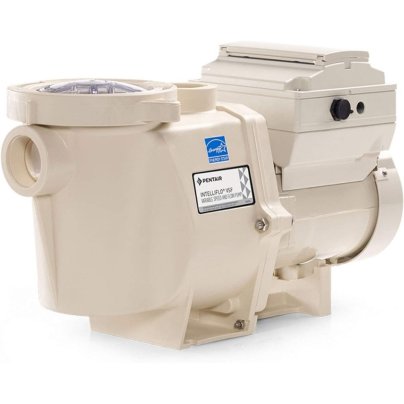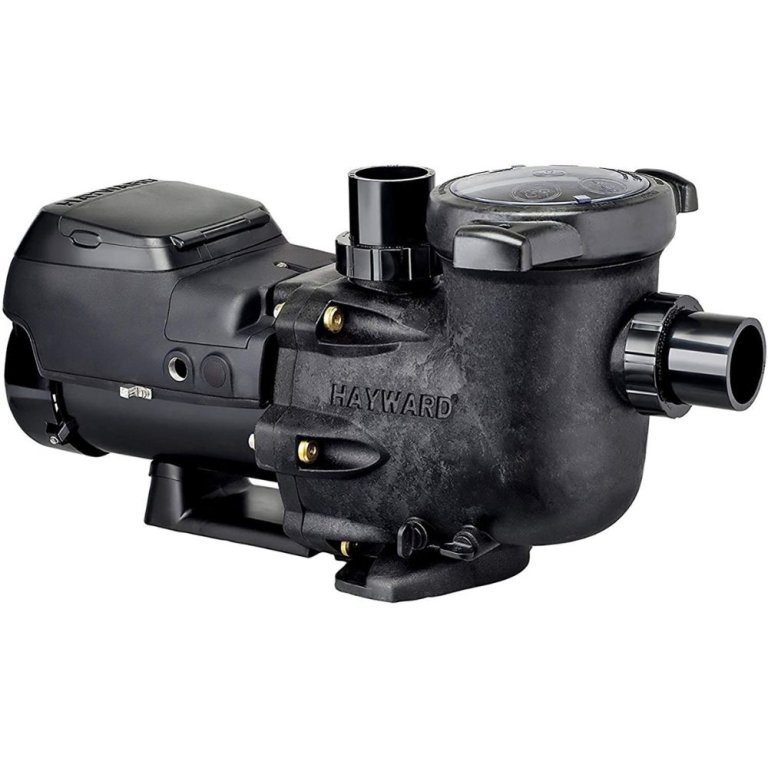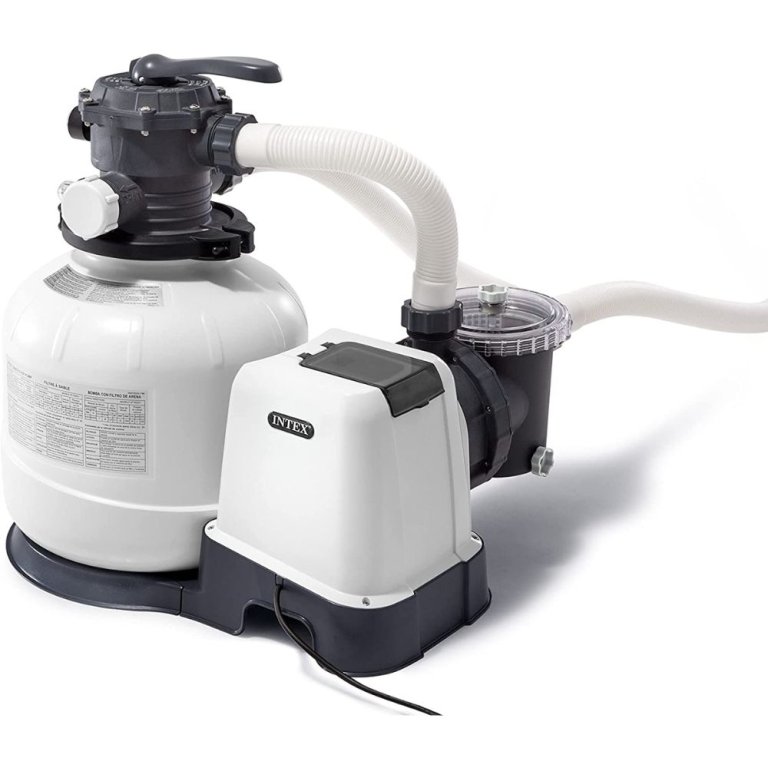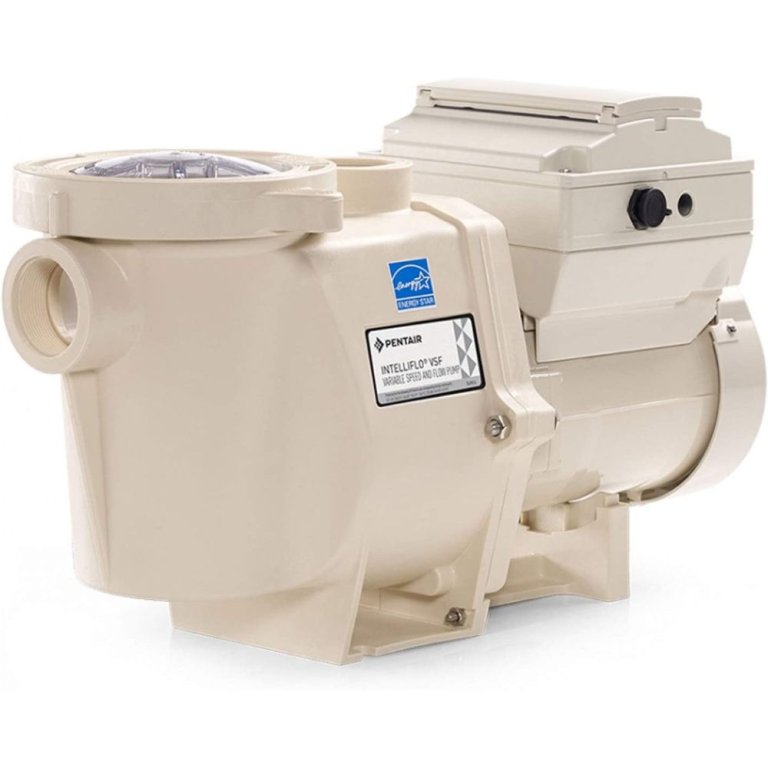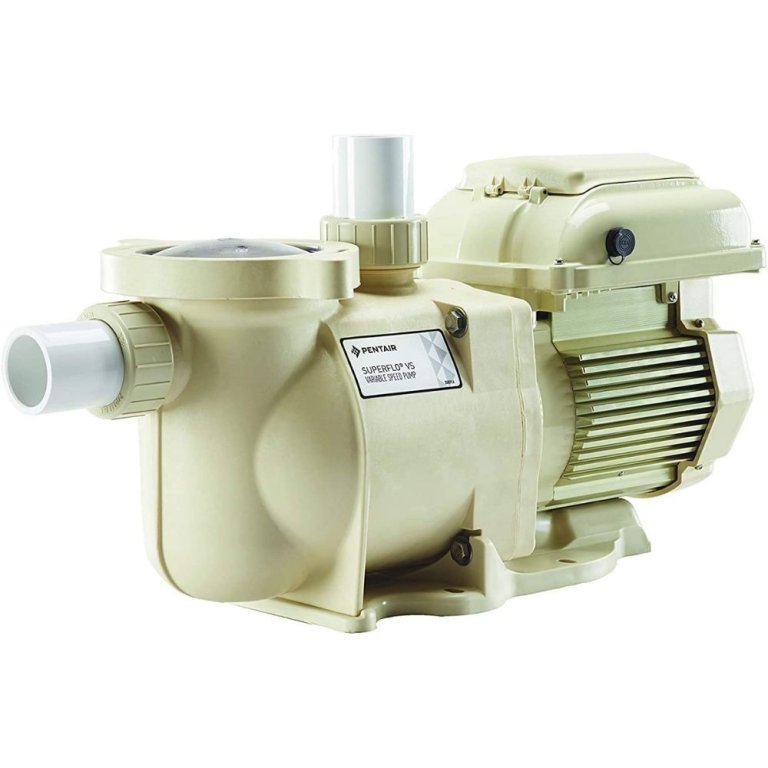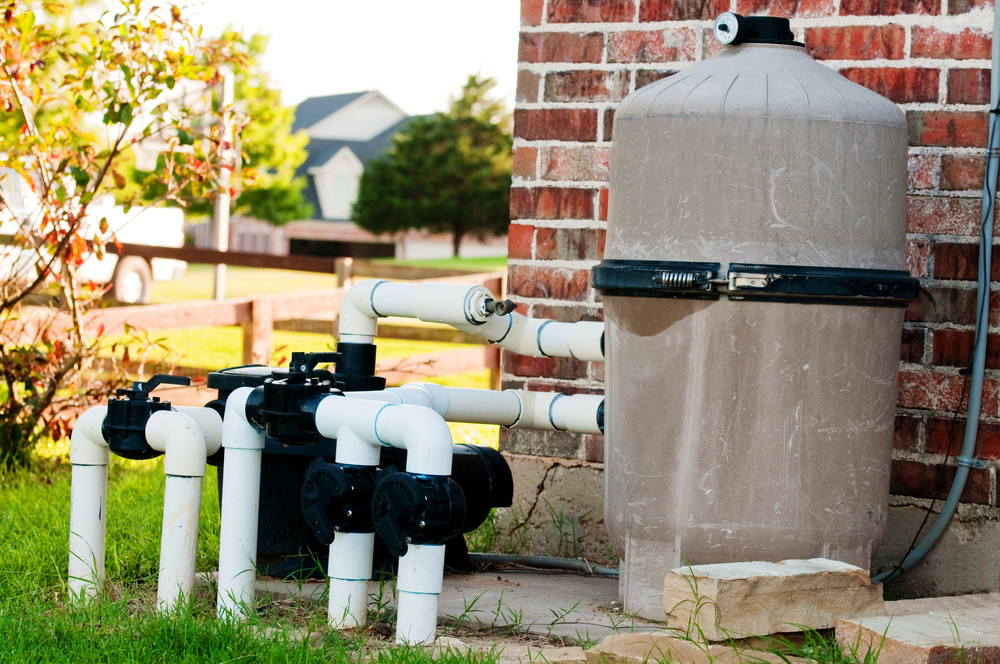
We may earn revenue from the products available on this page and participate in affiliate programs. Learn More ›
A pool pump circulates chemicals through pool water and filters out impurities and cloudiness. With a quality pool pump, you can spend less time taking care of your pool and more time enjoying it.
The best pool pump has the power to efficiently clean your pool several times in a 24-hour period without requiring constant attention. If you’re replacing your old model (the lifespan of a pool pump is 8 to 12 years) or shopping for a new pool, read on for the features to consider and some of the best options on the market.
- BEST OVERALL: Hayward W3SP3206VSP TriStar VS 2.7HP Pool Pump
- BEST BANG FOR THE BUCK: Intex 26647EG Krystal Clear 2800 GPH Sand Filter Pump
- BEST FOR ABOVE-GROUND: Pentair 011028 IntelliFlo Variable Speed Pool Pump
- BEST SINGLE-SPEED: Hayward W3SP2307X10 MaxFlo XL 1HP Pool Pump
- BEST DUAL-SPEED: XtremePowerUS 2HP Inground Pool Pump
- BEST VARIABLE-SPEED: Hayward W3SP2303VSP MaxFlo VS 230V Pool Pump
- BEST FOR SALTWATER: Pentair SuperFlo VST Variable Speed Pool Pump
- BEST QUIET OPERATION: Hayward W3SP3202VSP TriStar VS 1.85HP Pool Pump
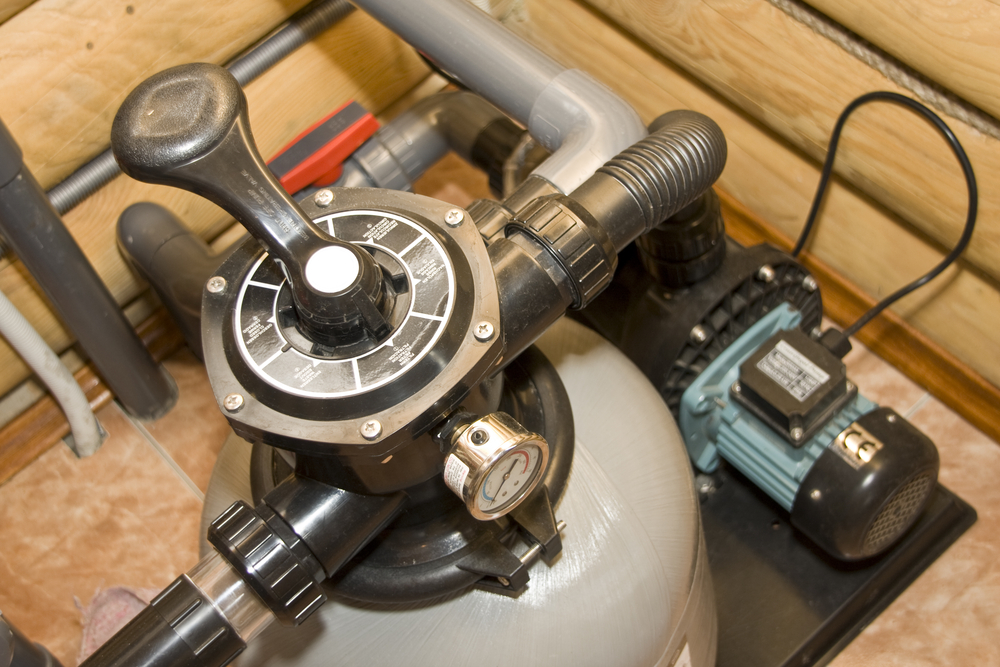
How We Chose the Best Pool Pumps
We researched the most sought-after above- and inground pool pumps in their respective categories and discovered that the best models are determined by their type, power source, horsepower, energy efficiency, and other special features.
To ensure our list had a broad range of options to satisfy different needs, we included single-speed, dual-speed, and variable-speed pool pumps that all rely on corded electricity to pump water. As for power, our top picks range from 1- to 2-horsepower motors capable of working with 26,000- to 46,000-gallon pools of either salt or chlorinated water.
As energy efficiency is important when considering this type of pool equipment, select options on our list are Energy Star certified and consume less energy than other options on the market. Many picks also include skimmer baskets with clear lids, programmable speeds, quiet operation volumes, and motors that run cool or cold for long lifespans. Select options are also compatible with diatomaceous earth (DE) pumps, sand filter pumps, and cartridge filters.
Our Top Picks
Just ahead are pool pumps from the most respected manufacturers in the residential pool industry, all of which are considered among the best available. The picks were compiled taking into account all the factors mentioned above.
Best Overall
Hayward W3SP3206VSP TriStar VS 2.7HP Pool Pump
Pros
- High-efficiency variable-speed design can save up to 90 percent in operating costs
- Comes equipped with an upgraded motor that’s quiet even at high speeds
- Equipped with digital controls, 4 speed options, and a 24-hour programmable clock
Cons
- Comes at a much higher up-front cost than other pool pumps
Product Specs
- Type: Variable speed
- Inground/above-ground: Inground
- Horsepower: 2.7
The Hayward TriStar pump isn’t cheap. In fact, it’s one of the most expensive pool pumps on the market. But what you’ll pay up front, you’ll recoup in a reasonable amount of time. That’s because the TriStar is equipped with a variable-speed pump capable of cutting pump operating costs by a whopping 90 percent, amounting to hundreds of dollars a year in savings on your energy bill.
You can program four speed options on the Hayward’s digital display and 24-hour programmable clock. With its powerful 2.7 horsepower, it’s capable of serving even large inground pools. In addition to being more efficient, the Hayward is also quieter than most pool pumps thanks to its upgraded motor drive. There’s also a fan-cooled motor, which helps extend the pump’s life.
Get the Hayward TriStar 2.7-horsepower pool pump at Amazon, Leslie’s, or Pool Supply Unlimited.
Best Bang for the Buck
Intex 26647EG Krystal Clear 2800 GPH Sand Filter Pump
Pros
- Provides both a pool pump and filter at an affordable price
- Combination design makes it easier to set up than separate units
- Pressure gauge and digital timer help control the pump and monitor performance
Cons
- Customers report that the pump and filter don’t feel very durable
Product Specs
- Type: Single speed with sand filter
- Inground/above-ground: Above-ground
- Horsepower: 0.6
Intex is well known for its line of affordable above-ground pools, so it makes sense that the company also offers one of the best budget options when it comes to pool pumps. This affordably priced combination pump and sand filter comes in five size options. The 16-inch pump, the largest size option, is equipped with a 0.6-horsepower motor that’s capable of filtering 2,800 gallons per hour (GPH), allowing it to service pools up to 17,200 gallons in size.
In addition to the sand filter, the Intex Krystal Clear has a large strainer basket for prefiltering. It also features a pressure gauge for monitoring the filter and a digital timer to program preset cycles.
Get the Intex pool pump at Amazon, Lowe’s, The Home Depot, Target, or Intex.
Best for above-Ground
Pentair 011028 IntelliFlo Variable Speed Pool Pump
Pros
- Variable-speed design can reduce operating expenses significantly
- Creates less noise thanks to an ultraquiet fan-cooled motor
- Equipped with digital controls that make it easy to program schedules
Cons
- Some customers complain about the pump leaking through the seal
Product Specs
- Type: Variable speed
- Inground/above-ground: Inground
- Horsepower: 3
Pentair’s IntelliFlo high-performance pump may have a higher price tag than some other models, but its ultraefficient operation makes up for that. With the ability to change speeds to suit demand, it uses significantly less energy than single-speed models, making it much cheaper to operate. The Pentair IntelliFlo has digital controls that make it easy to program schedules and monitor speeds. It also works with Pentair’s automatic chlorinators and chemical dispensers for simplified pool treatment. A 3-horsepower motor makes it ideal for larger pools.
The pump also uses an ultraquiet fan-cooled motor that runs at just 45 decibels. Built-in diagnostics help protect the pump from wear. A large strainer basket means it needs cleaning less often.
Get the Pentair IntelliFlo pool pump at Amazonor In The Swim.
Best Single Speed
Hayward W3SP2307X10 MaxFlo XL 1HP Pool Pump
Pros
- Uses Hayward’s hydraulic technology for improved energy efficiency
- Filter basket’s clear top makes it easy to monitor the amount of collected debris
- Durable construction of aluminum and high-grade plastic
Cons
- Some customers report that it’s not as powerful as other 1-horsepower pumps
Product Specs
- Type: Single speed
- Inground/above-ground: Inground
- Horsepower: 1
Hayward’s powerful 1-horsepower single-speed pool pump makes it the right pool pump for treating most inground pools. Though this model doesn’t have the Energy Star certification of Hayward’s dual-speed models, it still features the brand’s hydraulic technology that improves efficiency.
A clear top on the filter basket allows you to see when the basket needs to be emptied without having to open it. Port sizes for the intake and discharge are 1.5 and 2 inches, and the pump runs off a 115-volt power source. Hayward is known for durability, which shows in this model’s aluminum motor housing and high-grade durable pump plastic. This pump works with DE and sand filters.
Get the Hayward MaxFlo XL pool pump at Amazon, Leslie’s, In The Swim, or Pool Supply Unlimited.
Best Dual Speed
XtremePowerUS 2HP Inground Pool Pump
Pros
- Has 2 speed settings, which allows it to run more efficiently
- Can move 5,820 GPH, making it suitable for large pools
- Air-vented motor operates more quietly than standard pump motors
Cons
- Some users report that the pump runs hot and can overheat
Product Specs
- Type: Dual speed
- Inground/above-ground: Inground
- Horsepower: 2
XtremePowerUS offers the efficiency of a multispeed pump without the high purchase price of a variable-speed model. This pump operates at low or high speed, allowing you to save up to 70 percent over a single-speed pump. It features a powerful 2-horsepower motor capable of handling large pools with a flow rate of up to 5,820 GPH. An air-vented motor keeps this pump running quietly.
Easy-to-install electrical connections make swapping your old unit out with this one a relatively simple DIY task. The pump also features an easy-to-access strainer that can be removed and reinstalledwith a simple quarter turn. A large debris basket means longer periods between pump cleaning, and the strainer’s lid is transparent, so you can see how much debris has been collected before opening it up. It requires a 230-volt power supply and uses 2-inch fittings.
Get the XtremePowerUS pool pump at Amazon, The Home Depot, orXtremePowerUS.
Best Variable Speed
Hayward W3SP2303VSP MaxFlo VS 230V Pool Pump
Pros
- Energy Star–certified model can save up to 80 percent in operating costs
- Magnet-enclosed fan-cooled motor works more efficiently than standard motors
- Compatible with automation systems like those offered by Hayward, Pentair, and Zodiac
Cons
- Some users report that the installation instructions are difficult to follow
Product Specs
- Type: Variable speed
- Inground/above-ground: Inground
- Horsepower: 1.65
Although you may pay significantly more up front for this variable-speed pool pump, you’ll see that money pumped back to you in energy savings. This Hayward model uses an efficient magnet-enclosed fan-cooled motor. It features a programmable digital control that allows you to optimize the speed settings for eight different times of the day, allowing you to save energy when the pool is not in use.
When set properly, the Hayward Energy Star–certified variable-speed pool pump can save up to 80 percent in operating costs. It puts out 1.65 horsepower, making it powerful enough to handle large pools, while its hydraulic design allows for quieter operation than similar-size pumps. It features both 1.5-inch and 2-inch fittings and requires a 230-volt power supply.
Get the Hayward MaxFlo VS pool pump at Amazon, Target, Leslie’s, In The Swim, or Pool Supply Unlimited.
Best for Saltwater
Pentair SuperFlo VST Variable Speed Pool Pump
Pros
- Compatible with a broad range of RS-485 automated systems
- Built-in digital display and control panel with real-time 24-hour clock
- 3 programmable speeds allow you to save up to 80 percent on operating costs
Cons
- Some customers complain that the warranty requires the pump to be installed by a professional
Product Specs
- Type: Variable speed
- Inground/above-ground: Inground
- Horsepower: 2.2
Saltwater pumps must be tough to endure the corrosive nature of salt. This Pentair model features high-quality plastic construction that resists corrosion from salt and chlorine. It also includes a digital display that allows you to program different speeds throughout the day. You can increase speeds for better filtration when the pool is in use, then program the pump to reduce speed during periods when the pool is inactive. This feature may save up to 80 percent in operating costs over standard single-speed pumps.
This pump also includes an ultraquiet motor, and since it will work with either 115- or 230-volt power, you needn’t bother with rewiring for installation.
Get the Pentair SuperFlo pool pump at Amazon, Leslie’s, or Pool Supply Unlimited.
Best Quiet Operation
Hayward W3SP3202VSP TriStar VS 1.85HP Pool Pump
Pros
- Efficient operation with Energy Star certification saves money on operating costs
- Programmable digital display allows you to vary operating speed
- Large skimmer basket requires less frequent emptying to keep a pool clean
Cons
- Some customers complain about the durability of the pump
Product Specs
- Type: Variable speed
- Inground/above-ground: Inground
- Horsepower: 1.85
The price tag on this energy-efficient model from Hayward may be steep, but if you think big picture, you can see its value. When properly programmed, Hayward’s TriStar variable-speed 1.85-horsepower pool pump can save up to 90 percent in energy costs compared to other pumps. What’s more, its Energy Star certification might qualify you for energy rebates.
This variable-speed pool pump features a programmable interface, allowing you to cycle its variable speeds so it only runs when needed. The enclosed motor also makes this a very quiet pump. In addition to running efficiently, this model includes a large skimmer basket for less frequent cleanings.
Get the Hayward TriStar 1.85-horsepower pool pump at Amazon, Target, Leslie’s, or Pool Supply Unlimited.
Jump to Our Top Picks
What to Consider When Choosing a Pool Pump
When shopping for a new above-ground or inground pool pump, it’s crucial to consider several factors, including pool size, material, horsepower, and filter compatibility.
Types of Pool Pumps
Pool pumps come in three types: single speed, dual speed, and variable speed. Single-speed models are the least expensive but also the least efficient, while dual-speed and variable-speed models are pricier up front but allow you to save on energy costs.
Single-Speed Pumps
Single-speed pool pumps only have one speed, so the rate at which they pump water to and from your pool is fixed. You cannot increase the speed to improve cleaning power or decrease the speed to make the pump more energy efficient. Single-speed pool pumps are suited to run for about 8 hours a day, during which they should be able to turn over the entire volume of a pool at least once.
Dual-Speed Pumps
A dual-speed pump offers two different power settings, giving you two options for circulating water through your pool. This allows you to go with a higher speed when the pool experiences heavy use and needs more filtration or an efficient lower speed when it sees little activity. Dual-speed pumps are more expensive than single-speed pumps but offer 50 to 70 percent savings on energy costs.
Variable-Speed Pumps
A variable-speed pump gives you total control over its circulation speed, allowing you to make micro adjustments for optimal cleaning or energy efficiency. These pumps include programmable displays that will enable you to vary the pump speed throughout the day.
While these pumps are the most expensive of the three types, the ability to change speeds can save 80 percent or more on energy costs in the long run. A variable-speed pump can run 24 hours a day at a lower rate than a single-speed pump, turning over about twice the amount of water with the same energy use.
Pool Size
Pool owners must calculate a pump’s minimum flow rate to purchase the right size pump for the pool volume. The flow rate uses metric gallons per minute to determine how many times per day the pump can filter the entire contents of the pool. This is referred to as the number of turnovers. The pump should be large enough to turn over the pool at least once daily, although twice is preferred.
To determine how powerful a pump you need, use an online pool pump calculator, available at some manufacturer and retailer sites, or make the calculations yourself. Start by dividing the pool capacity by 24, which tells you how many gallons per hour a pump would need to circulate for a single daily turnover.
For instance, a pool with 10,000 gallons of water must pump about 1,250 gallons per hour to complete one turnover in 8 hours. To find the per-minute rate, divide this number by 60. For a 10,000-gallon pool, a pump needs a flow rate of about 21 gallons per minute to achieve one turnover per 8-hour cycle.
Keep in mind that if you’re using a single-speed pump, you may want to run it for only about 8 hours per day to avoid excessive energy costs. So a single-speed pump for a 10,000-gallon pool would need a flow rate of 42 gallons per minute or about 2,500 GPH if you want to turn over the water in your pool twice.
Material
Given that above- or inground pool pumps must run for 8 hours or more every day to perform their duties, they need to be rugged. Most pool pumps feature a durable stainless steel motor with built-in fans that keep them operating at a cool temperature. Pump housing should consist of high-grade plastic that can endure the harsh chemicals in chlorine and saltwater swimming pools.
Voltage and Horsepower
Most manufacturers don’t advertise the power of their pumps in gallons per minute (or hour) because flow rate depends on other factors beyond the pump itself, such as the size of the plumbing, the plumbing fittings, the pool filter, and even the elevation of the pump relative to the pool. All these elements, known as head resistance, can create resistance that decreases the pump’s flow rate.
Most swimming pools have an average head resistance of about 40 feet. A 1-horsepower pool pump capable of moving 100 gallons per minute will only be able to move about half that with 40 feet of head resistance.
With that in mind, a 0.5-horsepower pump with 40 feet of head resistance is suitable for a small pool of up to 11,000 gallons. A 1-horsepower pump with the same resistance will work for pools up to 26,000 gallons, while a 1.5-horsepower pump is suitable for large pools up to 30,000 gallons. A massive 2-horsepower pump can clean pools up to 46,000 gallons.
If you have a system with a pump located more than 40 feet from the pool or at an elevation of more than a few feet lower than the pool, your pool will likely have greater heat resistance. In this case, it makes sense to hire a professional to help you calculate what size pump your pool needs.
Pool pumps use either 115-volt or 230-volt power supplies, with most pumps under 2 horsepower being capable of using either. Most home appliances use a 115-volt power supply, while larger appliances, such as electric stoves and clothes dryers, demand 230-volt power supplies.
Make sure to check what the power demands are for the pump you wish to purchase. Switching out an old pump wired for 115-volt power with a pump that uses 230-volt power or vice versa is more complicated than installing a new pump that uses the same power source as the old one.
Plug-In vs. Hardwired
Some pool pumps can plug into standard 115-volt outlets, but most are hardwired into your home’s electrical system. Note that if you use a plug for the pool pump, the receptacle you use must be ground-fault circuit interrupter protected to prevent electrocution. If it’s within 10 feet of the pool, it should also be a twist-lock-style plug to prevent it from being yanked out, exposing the outlet to potential splashes.
Filter Compatibility
There are three types of filters for an inground pool: sand, cartridge, and DE. While most pumps will work with all filter types, check compatibility before purchasing a pump. Each filter also has a maximum flow rate based on filter type and size. Never operate a pump at a speed greater than the filter’s maximum flow rate, or you may damage the filter.
Energy Efficiency
Pool pumps vary significantly in terms of energy efficiency. While a single-speed pump will initially be cheaper, variable-speed pumps will ultimately pay for themselves in energy savings. A variable-speed pump is programmable, so you can set it to run at a slower, more efficient speed during downtimes when the pool is not in use and cleaning isn’t required.
It might be tempting to buy a 1.5-horsepower pump that goes well above and beyond what your pool requires. However, you’ll pay more in energy costs than with a smaller pump better suited to your pool’s size.
Noise Level
A noisy pump can be an annoyance when you’re trying to relax by the pool. Swimming pool pumps run between 65 and 90 decibels, which is the difference between two people chatting and a hairdryer. Most newer pumps incorporate quiet operation designs at this range’s low end. Pumps with fully enclosed motors offer the quietest operation, with decibel levels in the 40s—about the same noise as a refrigerator.
Maintenance
Maintaining your pool pump is part of regular pool maintenance. As the pump draws in water, a basket filters out hair, lint, and other debris the poolside skimmer misses. This filter must be cleaned regularly, though some pumps include large baskets to extend the time between cleanings. You’ll also need to clean the pump basket after vacuuming the pool.
The pump needs air circulation to keep the motor from overheating, so never cover a pump or plant trees or shrubs near it. If the pump motor has air inlets, ensure they are clear of any debris. During the offseason, when the pump is off, cover the pump and motor to prevent debris from building up on it.
FAQs
If you’re alarmed by a gurgling noise coming from your pump or want to know how to prime a pump, read on for answers to these and other common pool pump questions.
Q. Why isn’t my pool pump full of water?
You may need to prime the pump if it’s not full of water. Priming removes air from the pump and its suction line to allow water to flow through it. Most pumps are self priming; however, if your pump does not fill with water, you’ll have to prime it manually to get it to fill with water (see below). If there is no water in your pump, it could mean that the water level in the pool is too low, preventing the pump from drawing in water.
Q. How do you prime a pool pump?
Priming the pool pump is a relatively straightforward process:
- Begin by turning the multiport valve on the pool filter to recirculate.
- Remove any plugs in the return jets or skimmer.
- Open the pump cover and fill the pump with water if it’s dry. You’ll need to replace the drain plugs to do this.
- Replace the lid and turn on the pump. It will gurgle at first as it clears air out of the lines, but it should then run smoothly.
Q. Why is my pool pump gurgling?
If your pool pump is gurgling, it’s likely that air is getting into the pump, probably from the suction side. First, check the pool level. If the water level is low, the pump may be pulling in air instead of water. Also, check the flap on the pool skimmer to ensure it isn’t stuck, preventing the water from entering the pump intake. If both of these areas check out, the pump lid likely has a crack or a dried-out O-ring seal that you will need to replace.
Q. What happens if air gets into a pool pump?
If air gets into a pool pump, it will lose suction, preventing it from being able to suck water into the pump. It will also eject air into the pool, causing bubbles and a gurgling sound.
Q. How long should you run a pool pump?
This depends on the type of pump you have. A single-speed pump shouldn’t run more than 8 hours a day to avoid high energy costs. With this in mind, purchasing a pump that can cycle all the water in your pool twice in that time is crucial. A dual- or variable-speed pump can run at lower speeds for more extended periods.
Q. Can I replace my pool pump myself?
Replacing a pool pump can be a DIY job. Many pool pumps will fit fairly easily into the hole created by the old pump. However, check the warranty before replacing, as many major pump manufacturers won’t honor their warranty unless a certified pro installs the pump.


